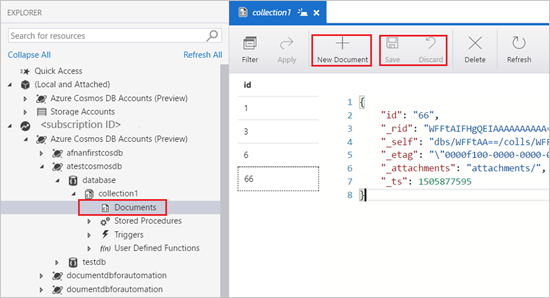Microsoft Cosmos DB in Azure Storage Explorer – public preview
We are happy to announce the public preview of support for Cosmos DB in the Azure Storage Explorer (ASE). With this release Cosmos DB databases can be explored and managed with the same consistent user experiences that make ASE a powerful developer tool for managing Azure storage.
The extension allows you to manage Cosmos DB entities, manipulate data, create and update stored procedures, triggers, as well as User Defined Functions. Azure Storage Explorer not only offers unified developer experiences for inserting, querying, and managing your Azure Cosmos DB data, but also provides an editor with syntax highlighting and suggestions for authoring your Cosmos DB stored procedures. With this extension you are now able to browse Cosmos DB resources across both Document DB and Mongo DB interfaces along-side existing experiences for Azure Blobs, tables, files, and queues in ASE.
Key customer benefits
- Enables ASE to be a one-stop shop to manage Azure database and storage resources
- Provides an easy way to understand explorer experience for Cosmos DB data and structure
- Offers flexible navigation experiences across Cosmos DB accounts and hierarchies
- Delivers better accessibility for file navigation and data management capability with reliable performance
Summary of key features
- Open Cosmos DB account in the Azure portal
- Add resources to the Quick Access list
- Search and refresh Cosmos DB resources
- Connect directly to Cosmos DB through a connection string
- Create and delete Databases
- Create and delete Collections
- Create, edit, delete, and filter Documents
- Create, edit, and delete Stored Procedures, Triggers, and User-Defined Functions
Get started
Install Azure Storage Explorer: [Windows], [Mac], [Linux]
For more information about Cosmos DB in ASE, please see:
- Azure Storage Explorer: Get started with Storage Explorer
- User Manual: Manage Azure Cosmos DB in Azure Storage Explorer
- Demo of Cosmos DB: Use Azure Cosmos DB in Azure Storage Explorer
Learn more about today’s announcements on the Azure blog. Discover more Azure service updates.
If you have questions, feedback, comments, or bug reports, please use the comments below or send a note to cosmosdbtooling@microsoft.com.
Source: Azure Blog Feed

